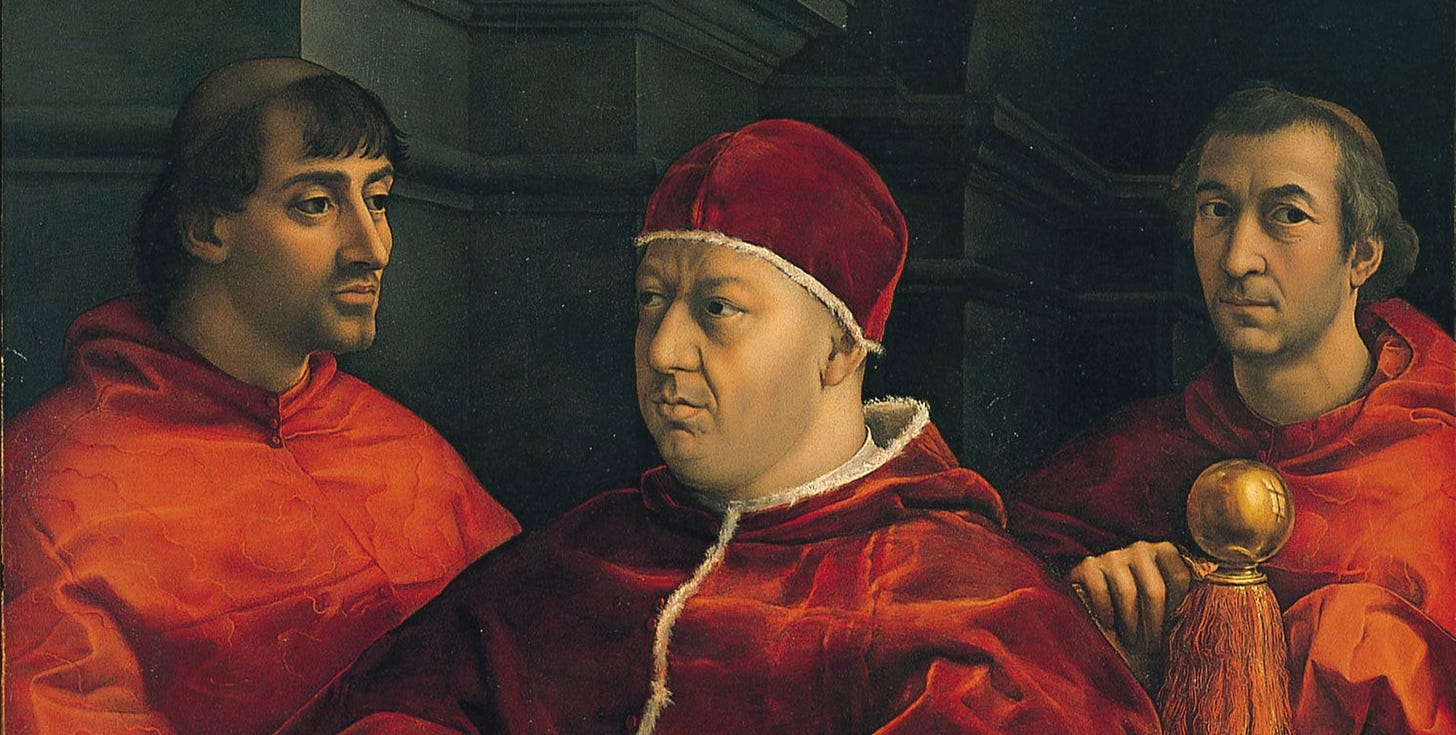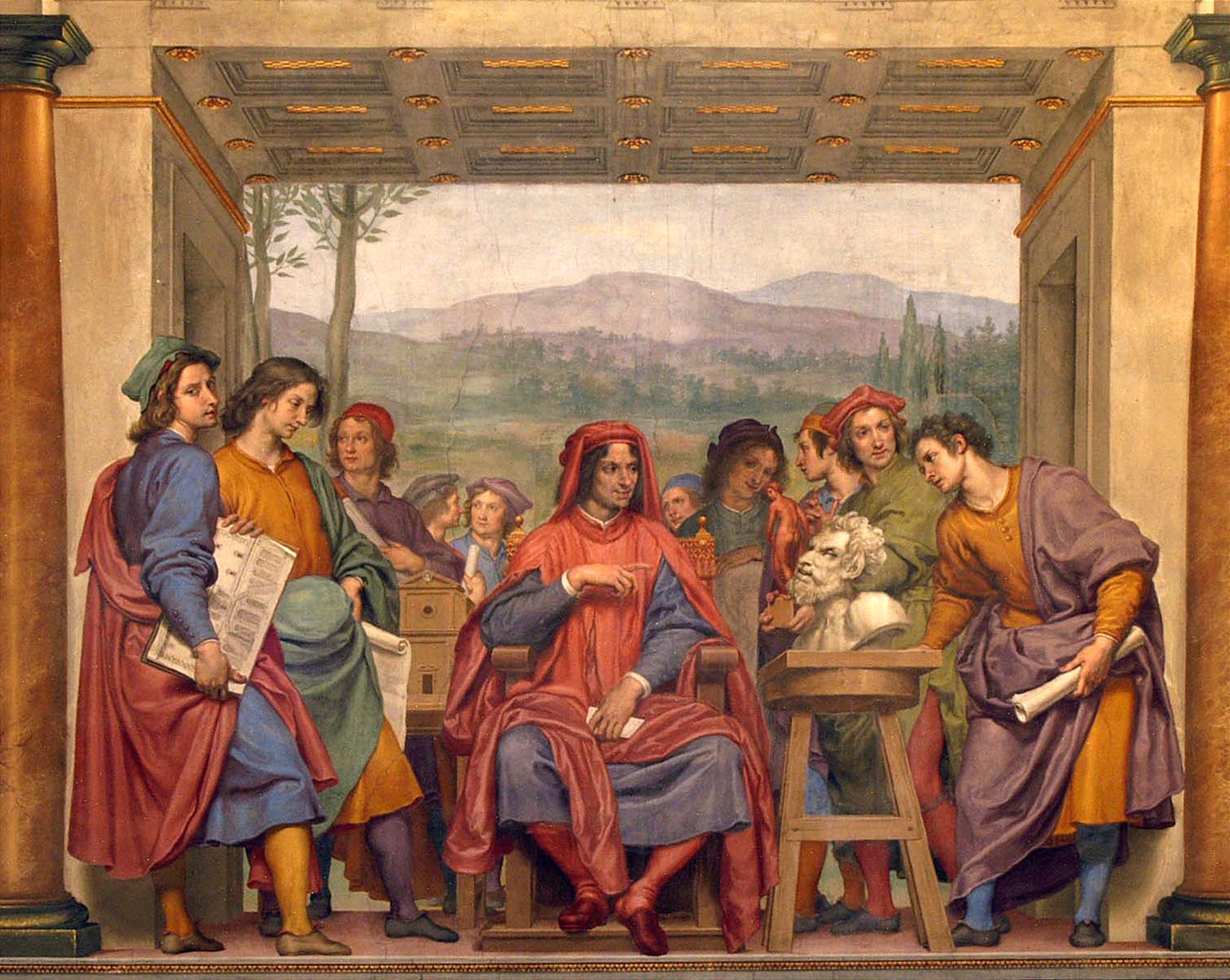The Medici Guide to Raising Children
How they passed down wisdom, wealth, and power...
Did the Medici harbor secret long-term ambitions for political power, or was their early accumulation of wealth merely an ambition in itself? From such a distance it is impossible to tell the secret machinations and plans of the Medici family at this stage…
-Paul Strathern, The Medici
The 300-year reign of the Medici family is among the most illustrious in European history. As “Godfathers of the Renaissance,” they transformed not just the city of Florence, but the course of Western civilization itself. Their legacy in art, politics, and finance still continues to shape the world in which we live today.
So how did they do it? In large part, the answer lies in the parenting style of Giovanni di Bicci, founder of the Medici Bank. Although often overlooked in favor of later Medici rulers, Giovanni’s story is in fact one of the most fascinating, as it reveals the secret to raising children worthy of empires.
Given that his descendants ruled from Florentine palaces to the throne of France and the chair of St. Peter, Giovanni’s track record speaks for itself. That’s why today, we look at three principles that defined how the first Medici patriarch raised his son Cosimo — who would later be honored as Pater Patriae, “Father of the Fatherland” — and what they can teach you about raising your own children.
The best part is, you don’t even have to run the world’s biggest bank to follow his advice…
#1: Know Thyself

Self-consciousness in the late 14th century was still firmly rooted in medieval mores: people tended to regard themselves as members of a family, rather than as individuals.
According to such a way of thinking, these early Medici would have naturally sunk their individual political ambitions in the long-term ambitions of the family as a whole, accepting that political power would only be achieved by the family in more propitious times…
Meanwhile it was best to lay the foundations, establishing the family and its wealth to an ever greater degree, in preparation.
-Paul Strathern, The Medici
The greatest gift Giovanni di Bicci ever gave to his children was a simple one: that of a father who knew himself and his limitations.
Giovanni was a competent man, and more than confident in his ability to transmit his business acumen down to his son, Cosimo. He indeed did so — and we shall see how in the next section — with incredible success. But as far as topics like culture, art, and philosophy were concerned, Giovanni was keenly aware of his shortcomings.
Such knowledge of his insufficiencies, however, proved the key to Giovanni’s success as a parent, for he realized what he was unable to offer his children. In the areas in which he could provide little guidance, he sought out tutors to teach Latin, rhetoric, and classical philosophy. He encouraged Cosimo to cultivate relationships with artists and architects, not so much for the sake of formal patronage, but as social and intellectual capital.
Giovanni had grown up while the Renaissance was still in its infancy, and thus had little exposure to its artistic and philosophical undercurrents. Yet despite this, he was still able to ensure his son grew up immersed in the best aspects of the burgeoning movement:
It had only been in his later years that Giovanni di Bicci had begun to understand that there was more to life than banking and its attendant risks. Money could be turned into patronage, and in the exercise of this patronage one gained access to another world of timeless values…
Cosimo, on the other hand, would be aware of this other world from his earliest years; his education made him a humanist, yet he also retained his father’s astute character, and Giovanni made sure that this was thoroughly applied to the skills of banking.
-Paul Strathern, The Medici
Perhaps most remarkably, Giovanni provided all of this for Cosimo without ever coming to resent his son for outshining him intellectually. He never felt threatened by Cosimo’s ability to fluently speak a “language” that he himself would never know. He instead focused on the value of giving Cosimo the best of both worlds — both the requisite cultural know-how, and the concrete skills of business.
It was indeed Giovanni’s fatherly ability to pass down the wisdom of the old alongside the insight of the new that enabled Cosimo to launch the Medici family to international prominence…
#2: Let Them Hold the Reins
The Council of Constance would prove to be the greatest social and political event of the early fifteenth century…Cosimo was twenty-five, and was already showing considerable promise as a banker.
…the trip to Constance on behalf of the Medici Bank was an undertaking of exceptional responsibility, and it was a mark of Giovanni’s absolute confidence in his son that he chose Cosimo for the job.
-Paul Strathern, The Medici
In Giovanni’s time, banks rarely survived the death of their founder. The trust a client cultivated with his banker did not immediately translate into confidence with his banker’s son, and, as a result, most banks were simply shut down and dissolved upon the founder’s death.
In light of this, what Giovanni accomplished was all the more remarkable.
Giovanni successfully raised a son who not only continued the family business after his father’s passing, but who took it to heights never thought imaginable. The key to it all came down to one thing — giving Cosimo responsibility, and giving it to him early.
What follows is a breakdown of how, at each stage of Cosimo’s development, Giovanni exposed his son to risk and responsibility in the family business. Even if you’re not in the same position as Giovanni, the principles behind his parenting approach can still be applied in many ways today:
Ages 6-12 | Foundations in Literacy & Morals
Cosimo’s education began with the basics: Latin grammar, reading, and writing. His humanist tutors drew from Christian and classical sources to teach him history and moral philosophy, and stories from Livy and Plutarch doubled as lessons in statecraft, ambition, and restraint.
Giovanni made sure the young Cosimo was grounded in religion: both in the doctrines of the faith, and also in his understanding of the Church’s role in Florence’s political life. This would bear fruit both in the the present and decades later, as much of Cosimo’s artistic patronage in the winter of his life was fueled by an especially meaningful trip he took to a local monastery.
Whenever possible, Giovanni also brought Cosimo to public ceremonies and processions. The young boy was instructed to observe who greeted whom, which families sat together, and where influence really lay in the city’s hierarchy. It was a lot for Cosimo to take in, but one can imagine how, standing proudly beside his father, he enjoyed every minute of it…
Ages 13-16 | Apprentice Banker & Early Civic Training

By his early teens, Cosimo was no longer just an observer. Giovanni put him to work inside the Medici counting rooms, beginning with currency conversion and basic bookkeeping skills. He was soon allowed to manage small accounts, which was his first exposure to real risk: any mistakes he made while managing them would have real repercussions, though they would be more educational than they were ruinous.
At the same time, Cosimo furthered his study of rhetoric. He began accompanying his father to council meetings, guild gatherings, and private dinners with merchants. Yet for all his study in the art of persuasion, Cosimo was not yet allowed to speak — he was instead instructed to learn how to read the room. It would prove as vital a skill to banking as it was to politics…
Ages 17–21 — Advanced Banking & Local Diplomacy
Cosimo’s responsibilities expanded rapidly in his late teens. His father entrusted him with larger and more politically sensitive accounts, ones in which interpersonal tact mattered just as much as (if not more than) bookcounting and arithmetic.
Continued private instruction in the fields of commercial law and trade regulations gave Cosimo a deeper understanding of the rules — and the loopholes — that governed merchant life. Around this same time, Giovanni also began introducing him more intentionally to artists and architects. Though these early relationships did not usually constitute formal patronage, they laid the groundwork for Cosimo’s later mastery of cultural capital.
Finally, Cosimo began traveling to nearby cities on short business missions. He was now allowed to represent the Medici Bank in negotiations, taking on the responsibility of upholding the Medici name. It was a task in which he would not only succeed, but would do so to an extent that shocked the entire world — because what happened next would forever change the Medici family fortunes.
At the legendary Council of Constance, when Cosimo was just 25 years old, the fate of the Medici Bank rested on a single decision. Cosimo proposed a crazy idea to his father — and the response he got back was even more remarkable. Not only did it underscore Giovanni’s incredible knack for dealmaking, but it also enabled the Medici to do the impossible, and snatch victory from the jaws of defeat.
It also reveals Giovanni’s third principle of parenting, and the secret to raising a worthy heir…







